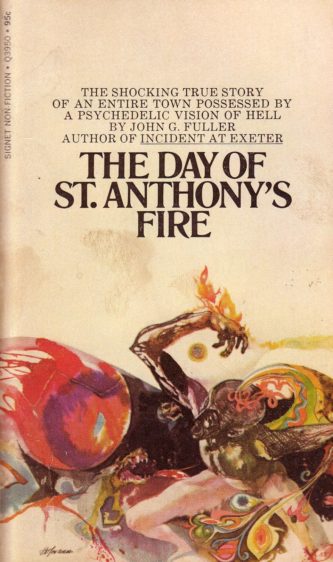 By JOHN G. FULLER (Signet; 1968/69)
By JOHN G. FULLER (Signet; 1968/69)
THE DAY OF ST. ANTHONY’S FIRE is a real-life horror story that rivals just about any fiction. The author was the late John G. Fuller (1913-1990), who specialized in horrific true-life accounts (including THE DAY WE BOMBED UTAH, THE GHOST OF FLIGHT 401 and WE ALMOST LOST DETROIT). Here he investigates a “medieval plague in modern times” that occurred in the French village Pont-Saint-Esprit in August of 1951, when a batch of bread made from contaminated flour was consumed by over 300 residents (the French love their bread), causing widespread illness and insanity.
As related here, one man, believing himself a tightrope walker, jumped up on a wall and nearly fell to his death–despite the fact that he was afraid of heights. Another spent the next week or so writing non-stop, just as a young boy attacked his mother, dogs savaged their owners and a woman perpetually sobbed for days on end. Others imagined themselves torn apart by animals, set on fire, shrinking, able to fly, etc.
As was his custom, Fuller relates these bizarre happenings in a crisp reportorial style that’s admirably free of sensationalism or melodrama. The result is in an account that reads like an especially good novel, capturing perfectly the anguish of normal people helpless to stop themselves from being plunged into psychosis. I will, however, admit to skimming through much of the book’s final section, detailing the 10-year long efforts of the townspeople to get remuneration for their ordeal, which lacks the pace and economy of the rest of the book.
What exactly set off the “Day of St, Anthony’s Fire,” you ask? The precise cause was never officially determined (at least not at the time of this book’s publication), but you’ve probably already figured out what is commonly believed to have gotten into the bread that fateful day. It was apparently an especially potent form of ergot fungus akin to a substance that was fairly popular when THE DAY OF ST. ANTHONY’S FIRE was published in 1968 but largely unknown back in 1951: none other than lysergic acid diethylamide, or LSD.
